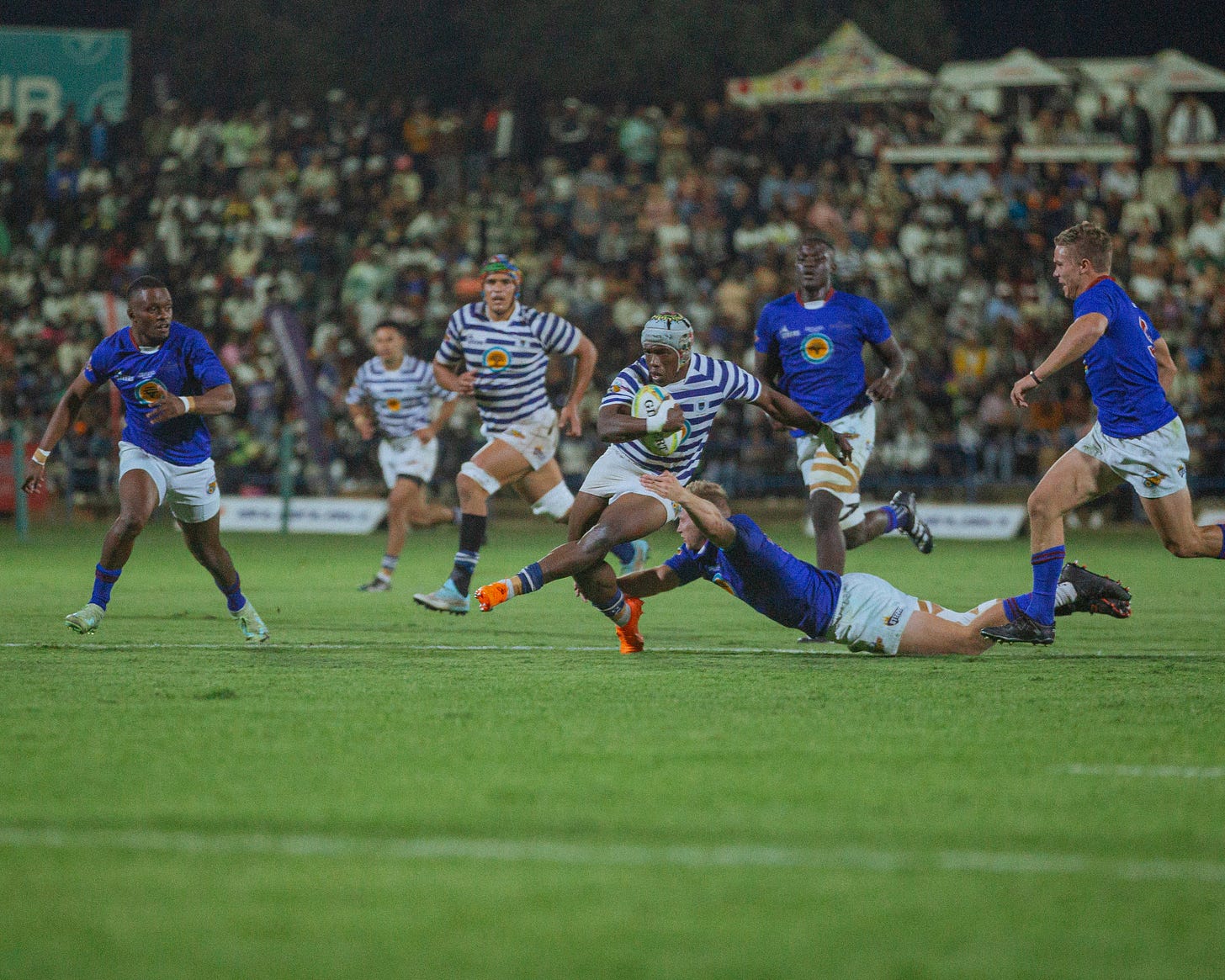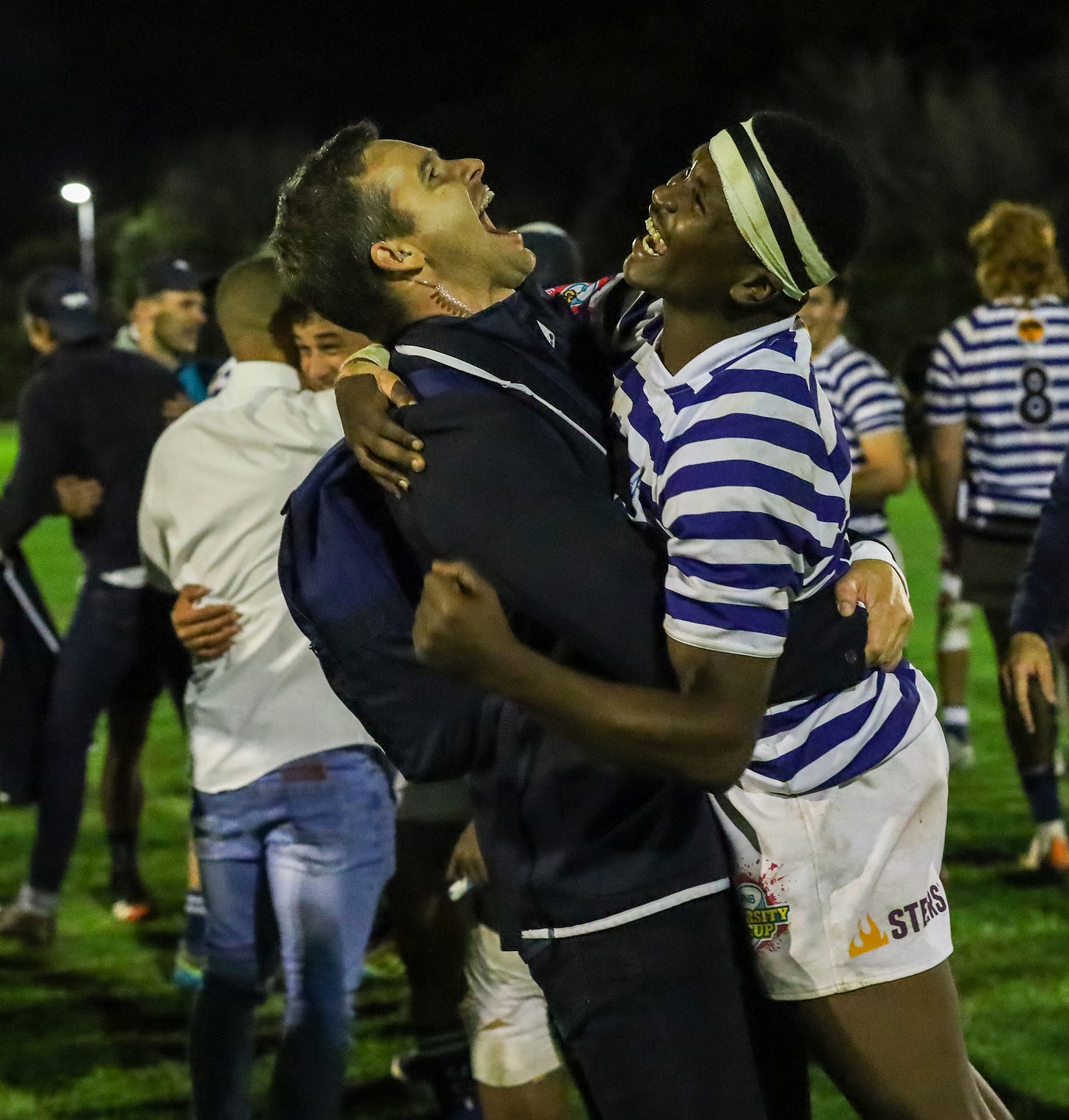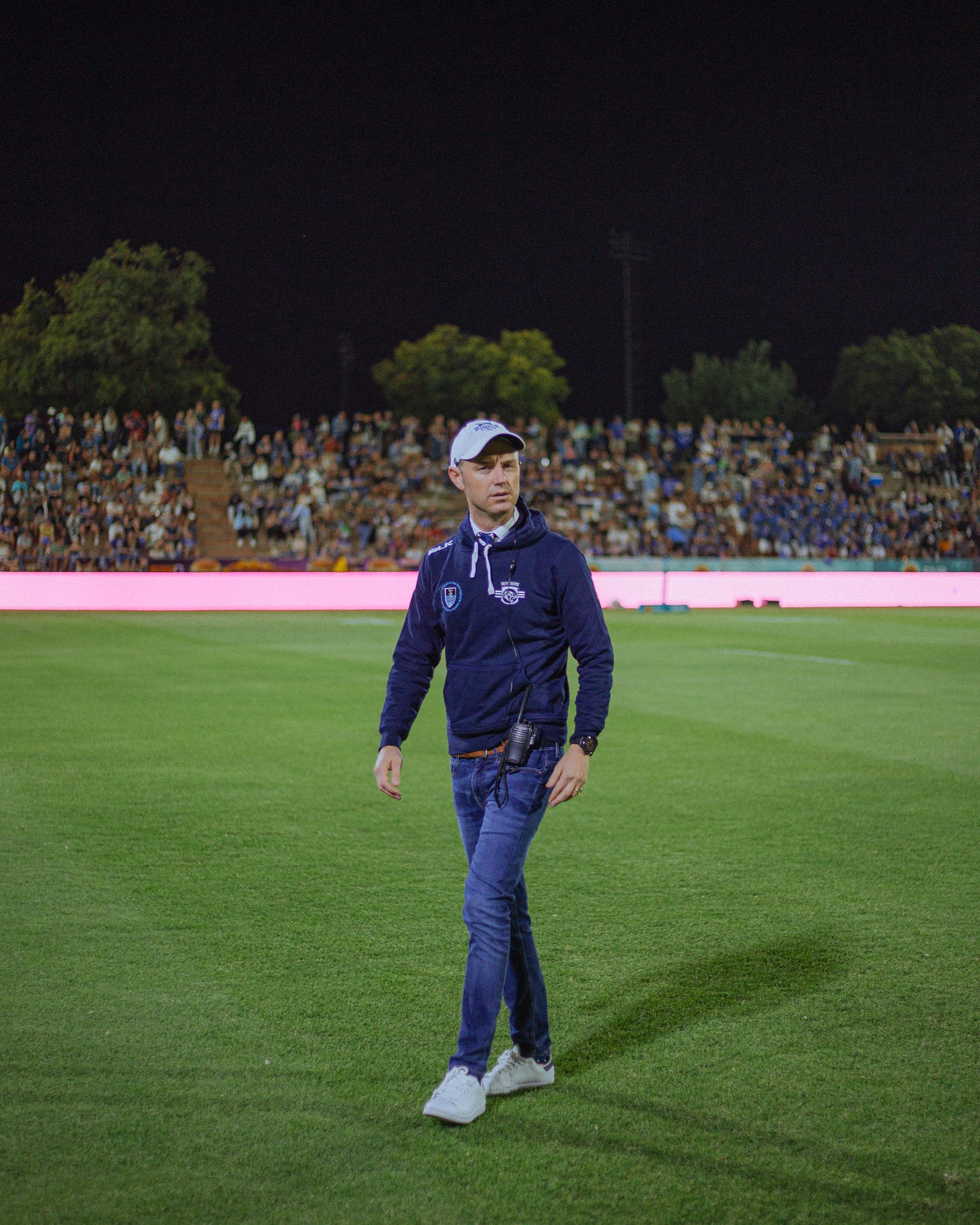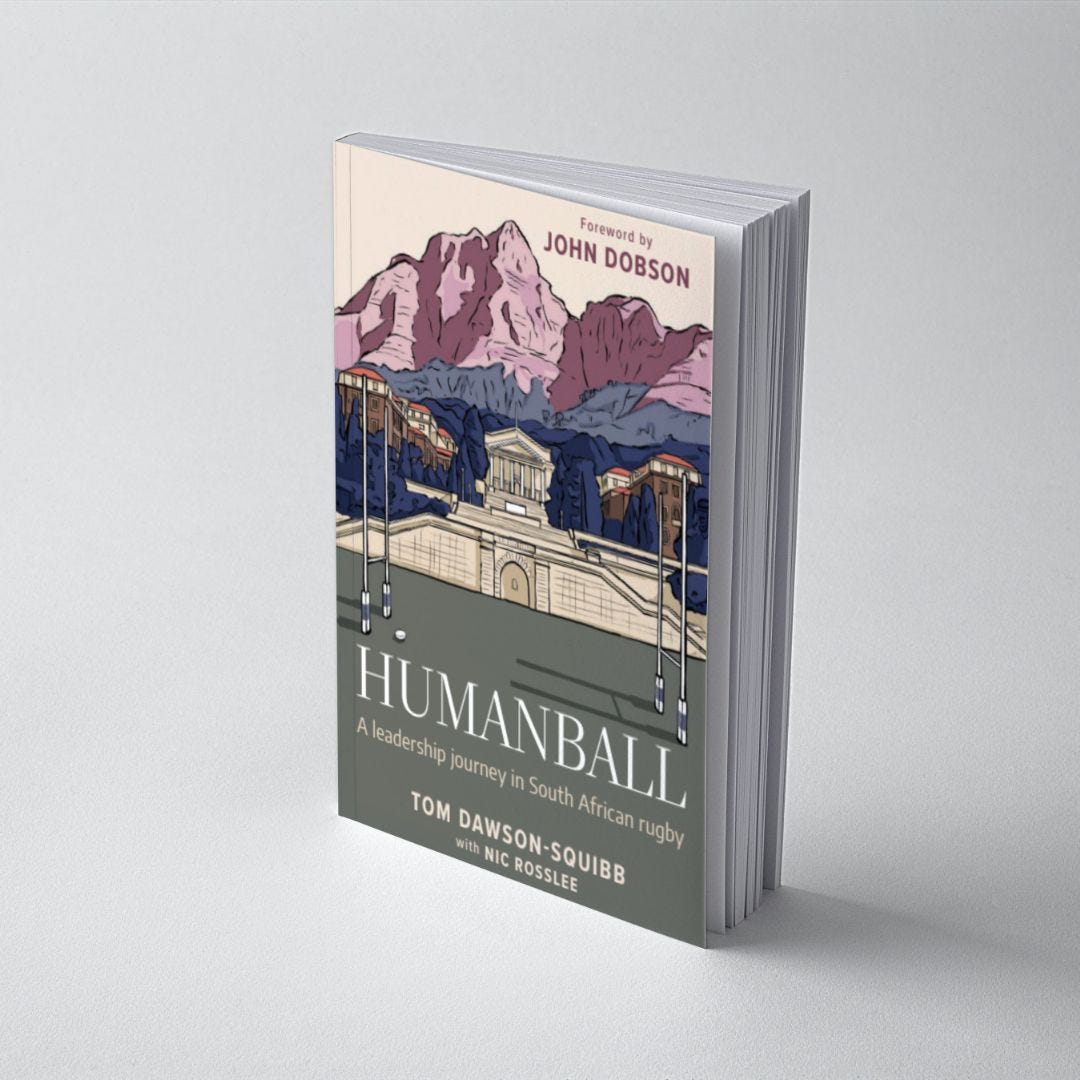Relationships Matter
A Leadership Journey in South African Rugby
Excerpt from Humanball: A Leadership Journey in South African Rugby
(Pre-order a copy of Humanball HERE)
It was not meant to end this way.
It was just minutes after my final game as the Head Coach of the University of Cape Town’s rugby team. For five years, leading the Ikey Tigers, as they’re known, had been my obsession. We were in Bloemfontein, having just played in the FNB Varsity Cup final against the University of the Free State Shimlas.
With a few minutes to go, we were trailing by five points but still very much in the game. Our reserve hooker, Johan Lombard, scored a try off the back of a maul to level the scores at 42-42 with a minute left on the clock. Ntokozo Makhaza, our left wing and the top points scorer in Varsity Cup history, had a chance to convert and put us ahead by two points in the match’s final minute.
Makkers, as we called him, was named the player of the tournament after the final. Throughout the season he had contributed so much to our team’s efforts—an all-action winger with pace, physicality and flair who also contributed so consistently off the tee. It was not an easy kick from out wide on the right, but I had seen him make these match-defining kicks for us many times before. On that day, his kick sailed just wide.
Our 2024 Varsity Cup campaign began in Bloemfontein against the Shimlas with a 38-32 win, where two Makkers penalties at the death won the match for us. Just over three months later at the same venue, the final started in pulsating fashion with two exceptional tries from our hooker, Keagan Blanckenberg, who threw a dummy that Danie Gerber would have been proud of, and our centre, Jonathan Roche, who ran onto a perfectly weighted chip kick from our scrumhalf, Asad Moos. Unfortunately, the story of the match was that every time we pulled ahead with a try or two, we’d leave the door open for the Shimlas to come back into the fold.
Whether those two extra points from Makkers would have won us the game is anyone’s guess. Off the resultant kick-off, we gifted possession back to the Shimlas, which was both avoidable and costly. Within a couple of phases, the Shimlas were awarded a penalty, and Ethan Wentzel kicked it over for the decisive three points. The final score: 45-42 to the Shimlas.

Sitting pitch-side at Shimla Park on April 22, 2024, just after 9 pm, I felt hollow. My mind raced in different directions. I felt a wave of anger at the refereeing decisions that didn’t go our way and disappointment at conceding 45 points in a final. But once those waves passed, I was left with a feeling of complete emptiness. I couldn’t believe we let this happen again.
My five-year tenure as head coach of the Ikey Tigers began in 2019 ahead of the 2020 Varsity Cup season, which was interrupted by COVID-19 before the playoffs. Over the next four years, we played in three of the four finals (2021, 2023, and 2024). We lost all three. While each campaign was a journey, each with its own unique emotional rollercoaster, in the 2021 and 2023 finals, we knew that we were the underdogs.
In 2024, it certainly felt like it was anyone’s game between us and the Shimlas. We had beaten them earlier that season and in the 2023 semi-final. Several players were in their final UCT season, such as our inspirational squad captain Luthando Woji (who missed the final through injury) and team captain Johan van Rhyn (who stepped in in Woji’s absence). It was also going to be my last season as head coach.
Even though the other coaches were around me, at that moment, I felt alone, and I really wanted to be alone. I saw my wife, Storm, standing beside her mother, Hilary, who had flown up for the match from Cape Town. They were both in tears. I had nothing to say to anyone. I felt ashamed. I felt embarrassed. I felt like we’d come so far together, only to fold when it truly mattered. I went over and hugged Storm. She couldn’t get a word out either.
Francois Pienaar, former Springbok World Cup-winning captain and founder of the Varsity Cup, had just given me, our management team, and a few of our senior players our third silver medal in four years. I gritted my teeth once more and went on that lonely walk back to the pitch-side coaches' area. I sat down, put my head in my hands, and stared at the grass.
We had a 23-year-old strength and conditioning (S&C) intern named Connor Dixon. We called him Snoop because we thought he looked like the rapper Snoop Dogg. He was the least experienced member of our staff, and this was his first season with the team. It was also his first time touring with us, as having two S&C’s on tour was a luxury we couldn’t afford. We flew him up to the final to thank him for his commitment throughout the season.
I said, “Sorry, Snoop. I don’t have anything to say right now.” He replied, “Don’t worry, you don’t have to say anything. What we do in this team is we look after each other. So I’m going to just sit here and be here with you.” I said, “Thanks, bro.”
When Connor joined the squad for pre-season about six months before that evening in Bloemfontein, he wouldn’t have said boo to a goose. I thought back to the campaign launch of our 2024 season. Connor came to me at the peak of Lion’s Head and told me, “I’m a very introverted guy, and I’m not good in teams… But I cannot explain how much I feel I belong in this place. It’s made me come out of my shell. I’ve made friends. I drink the occasional beer to my own song, and I just feel part of it.”
So here I was, sitting beside this young man, whom I’d hardly known a few months before, in my lowest moment. I was distraught and angry, and he was telling me that he was here for me because, “This is what we do.” Those minutes after the match are weird times in sport as you are never really sure what to do. The wins and losses present such binary outcomes in emotion that it’s difficult not to get carried away in either direction.
I couldn’t stay at the after-match function for long. I had a short chat with our captain that day, Johan van Rhyn, who I could tell was, like me, wearing the defeat like a cheap Halloween outfit. I gave him a hug and remember posing for a photo that I hoped we would be able to look back at together one day and say, “It really wasn’t the end of the world, was it?” but no matter how hard we tried that perspective was completely elusive.
I struggled to piece together what I was feeling, and for a while, I managed to put on a brave face watching the Shimlas share their elation. But then I sensed that I might say or do something I would regret as I was completely on edge. I went to sit in the team bus half an hour before anyone else. I didn’t know what to say, but I’ll be the first to admit that this isn’t what leadership looks like.
When we got back to the hotel, the team went to the bar for a drink together, which would have been good for me. Perhaps somewhere between beer three and six, I could picture myself loosening up and possibly even getting somewhat poetic about dealing with loss and the meaning of life. I would not have had to be dignified in defeat and could be myself around this team I loved so much. I must have been somewhere near the sharp edge of human emotion, and my body had other ideas as we walked from the team bus to the lobby. I started to feel really sick. I went to my room and threw up for hours.
Once more, I was disappointed and embarrassed that I could not honour my team by having a final drink with them. I went to sleep and woke up the following morning in the jeans, UCT shirt, and tie I’d been wearing the night before. When I woke up my initial thought was how on earth was I physically going to board a flight today. But I calmed down and started feeling a bit better.
I would love to say that when Connor came and sat beside me, I reflected on the positives of our journey or saw that it wasn’t the end of the world. But I did not. It took me months to process it all, and I still don’t think I’m over that loss. I doubt I ever will be.
But when I think back to that moment, there is something incredibly special there. I had consistently said that we would always live our values. Talk is cheap, they say, and to know that our values were alive in that moment, our lowest moment together, is something I think about as often as the most exhilarating tries we scored.
Our three values, Relationships Matter, Compete Always, and We Are Real, were memorialised in 2022 after I met one-on-one with every player in our squad, often in their own homes or at mine. I also met their digs mates and even some of their girlfriends. I had been in environments before where the values were just words up on the wall and they made no difference to the way that people behaved. We didn’t want a rules-based culture but rather wanted our values to drive the desired behaviours. It was crucial that the players bought into this idea which is why I invested so much time and effort into this process.
I asked each player a bunch of questions, including, “What’s the value that you most like to be around?” and “What makes this club special?” I wrote every person’s answer on a whiteboard and then clustered their answers into groups. The three values summarised everything I had been told by the players and I felt that a picture of everything that the club stood for was emerging.

Relationships Matter felt like the value that was almost synonymous with the UCT Rugby Club. The importance of this value in rugby cannot be overstated as there is no sport that requires interdependence between its players as rugby does. In the 100 + years of club history, even when not on the field, we were always champions in the pub. I, however, believed that this had to run far deeper than the pub. So, we worked tirelessly to foster connection, trust and communication at every level within our team.
Compete Always wasn’t just about winning; it was about pushing yourself to be better every day. We introduced a House System that brought a level of competitiveness, and sometimes ridiculousness, into every training session and get-together we had in the calendar. We also implemented an internal award, The Saw, which was awarded to the most dedicated player in training after each session. Having four houses compete for an end-of-season award at every session may sound trivial, but if you’ve ever been up to UCT’s Green Mile on the coldest and windiest nights you’ll know that at times you may need to inject a little extra motivation into the environment.
We Are Real ensured that as a squad we communicated honestly and clearly. I often say that bullshit and rugby go together like bacon and eggs, and that’s where this third value comes from. Being real is tougher than it sounds in a high-performance environment—in the short term, it is almost always easier to not have the difficult conversation, but in the long term, this pays off. We Are Real acted as the guardrails for our conduct because the players told me, “Please be real with us, Tom.”
There was a temptation to structure this book around these three values, but when I started writing down my favourite stories I realised that there was a bit of each value in every story. So the book is divided into stories that relate to the three themes, Defy, Explore and Simplify.
Defy is largely about defying the expectations that others have of you—and those you have of yourself. It’s the moments where we went against the odds, challenging the opposition but also the limitations we put on ourselves.
Explore is about embracing curiosity and going where you’ve never gone before. It represents our willingness to try new things and to innovate in our training, our tactics, and our relationships with each other.
Simplify is about going from chaos to clarity and taking decisive action—turning noise into music, distilling our approach to what truly mattered, and being bold in executing that vision.
The intention of this book is not to provide my leadership playbook. Instead, it’s a collection of the most impactful stories from my leadership journey, primarily through the lens of my experience at UCT RFC. It also features short essays from some of the most prominent leaders I worked alongside during my tenure at UCT. Through these narratives, I hope to share the lessons learned, the challenges faced, and the victories—both on and off the field—that have shaped my approach.
Reflecting on my five years as the Ikey Tigers’ head coach, I am so grateful for the opportunity to lead many exceptional young men. To have had captains such as Liam Greenhalgh, Niel Otto, Luthando Woji and Johan van Rhyn leading the team onto the field made my job that much easier. All four of them were all lion-hearted forwards who were prepared to stick their heads into the ghastliest places for the benefit of the collective. The currency of sport is trophies, and in that currency as a head coach, I am poor. But the real currency of life is found in your connections, and in that currency, I feel rich for my experience at UCT.
When people ask me for advice on improving their performance, I always say that the key is to surround yourself with people who are better than you. In many ways, your success is defined by the company you keep. At the heart of this book are the stories of the incredible individuals I had the privilege to stand alongside at the UCT RFC—people who pushed me, inspired me, and made me better.
Excerpt from Humanball by Tom Dawson-Squibb. Pre-order Humanball at www.humanball.co.za.


